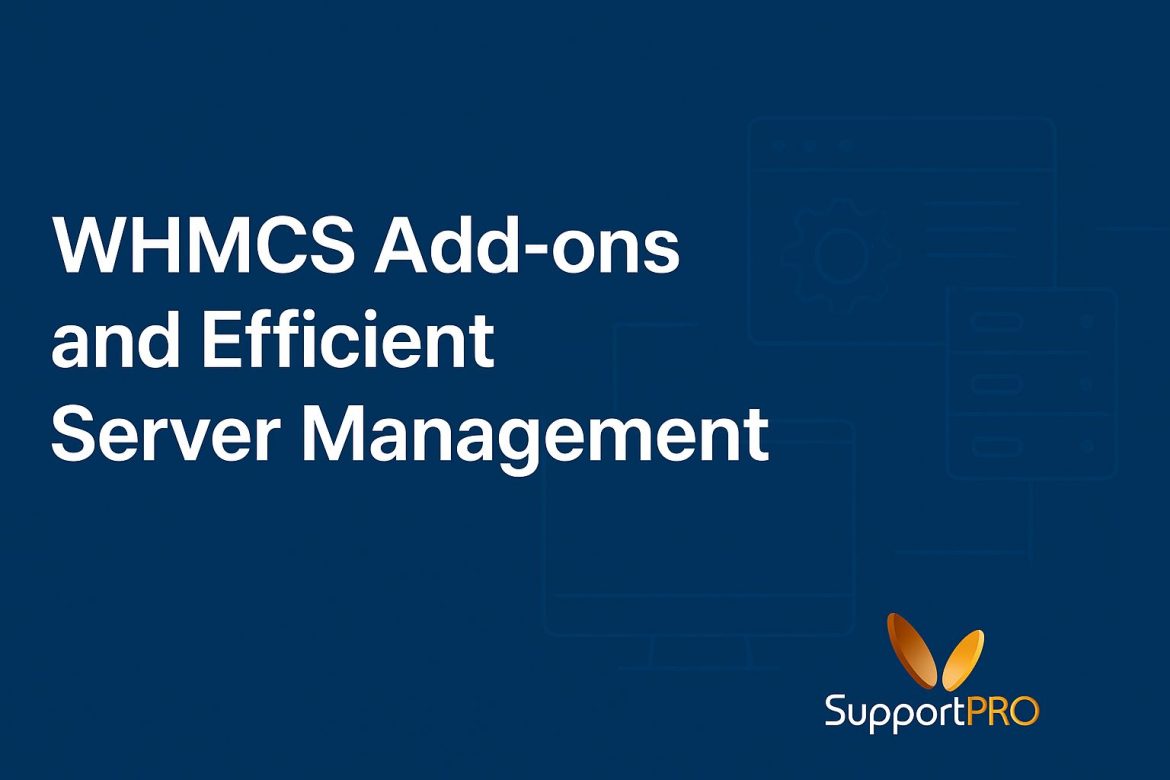Introduction
In the cloud and hosting industry, effective server management is no longer optional. Today’s customers want the fundamentals: accurate billing, timely support, effective provisioning and uptime. To meet those expectations, managed service providers (MSPs), data centers and hosting companies need effective and efficient systems.
For many years, WHMCS (Web Host Manager Complete Solution) has been the reliable automation platform for web hosting companies. It integrates billing, provisioning, and client support in one place. However, the true power of WHMCS stems from its vast array of add-ons. These modules turn the software into the nerve center of hosting business operations, beyond just billing.
In this blog, we will look at why WHMCS is popular, the types of add-ons for server management, and how we help providers use them.
Why WHMCS is important to Hosting Providers
Since it could solve many of the issues that hosting companies face, WHMCS became popular. It provides accounts on Plesk, DirectAdmin, cPanel, and cloud platforms and automatically sends bills and invoices. It also encompasses customer support resources such as knowledge bases and ticketing systems.
Yet, as businesses continue to expand, the platform’s core capabilities alone are insufficient. Additional server information, more sophisticated monitoring, abuse protection and quick recovery are important to the providers. Add-ons provide WHMCS with the additional power it needs to evolve and keep up with the times.
Key Add-on Categories
1. Monitoring Add-ons
The basis of hosting Monitoring is With WHMCS monitoring add-ons, it is possible to observe uptime, CPU usage, memory usage, and disk space via the WHMCS interface. Automatic notifications alert the admins immediately in case of failure. Another benefit for clients is that they can constantly monitor server performance without leaving the interface.
Imagine a user who has several VPS servers to manage. Instead of juggling several tools, administrators can simply get into WHMCS and see it all in one place. It simplifies, speeds up, and enhances the transparency of the process.
2. Abuse Management Addons
Spam, DDoS attacks, and malware are a constant headache for hosting companies. Abuse management add-ons take the stress out of abuse. They log abuse cases automatically, attach them to relevant customer accounts, and escalate tickets to the support team.
This also ensures that every case gets adequate attention. More trust from clients.
3. Backup and Disaster Recovery Add-ons
Backups are the hosting safety net. With this WHMCS backup module, the vendors can set the VPS, cPanel, and dedicated server automated backup either daily, weekly or monthly. Self-service features empower customers to restore their own data.
These popular add-ons refer to such storage systems as FTP servers, Google Drive, or AWS S3 in order to facilitate data retrieval. For instance, with just a few clicks, a customer can restore their WordPress site to an earlier state if they accidentally delete it.
4. Provisioning and Cloud Automation Add-ons
Customers today desire immediacy. Add-ons that enable provisioning do so. Addons enable hosting companies to interact with AWS, Azure and GCP clouds, automate VPS instances spinning up on OpenStack, VMware or KVM platforms, or even distribute custom software licenses.
Because of this, the customers can have access to the products they purchased immediately.
5. Support and Communication Add-Ons
Support doesn’t stop at ticketing. Add-ons may enable features such as live chat, intelligent ticket routing, or multi-channel communication within WHMCS. For you, it means that downtime alerts or abuse reports automatically create tickets in your system because no client should be missed.
6. Add-ons for Server Manager
Arguably the most effective, server manager add-ons are those that introduce high-level control functionality into WHMCS. Admins can reboot servers, manage IP addresses, reinstall OSs, and monitor bandwidth/disk space usage from a single panel.
SupportPRO’s Server Manager Addon would be a good example. It arranges features in such a way that enables hosting providers to expand their operations without spending too much on maintaining several platforms.
Why Add-ons Boost Efficiency
When used well, WHMCS add-ons can:
– Reduce operational costs by cutting down manual work.
-Enhance customer satisfaction through self-service avenues.
-Enhance reliability through proactive monitoring.
-Scale to thousands of customers without needing large support teams.
Struggles with Add-ons
Of course, it’s not always plug-and-play. Providers have to deal with:
– Custom modules integration issues.
– Security risks related to poorly maintained add-ons.
– Rising costs due to multiple subscriptions.
– The need for customization to fit unique workflows.
At SupportPRO, we understand that you need more than just the software to make it work. We specialize in custom development of unique add-ons for businesses and offer our Server Manager Addon. We also provide integration support for other add-ons and 24/7 coverage so that our engineers can be paged by alerts or abuse reports. We also manage the maintenance through patching and security through regular auditing to minimize risks. By combining automation and technical support, SupportPRO empowers hosting providers to leverage WHMCS add-ons for growth.
Conclusion
Although WHMCS has been used as the base for hosting automation, its add-ons set it apart as a feature-rich server administration software. From server control and monitoring to backups and abuses, these solutions enable hosting companies to act more freely, intelligently, and efficiently.
But software alone is not enough. The best plug-ins will not help you if you do not know what to do. Hosters who work with SupportPRO obtain more than just the software. A committed team endeavors to incorporate security, scalability, and compliance into their business systems.
In the ever-evolving hosting industry, people and technology integrate to create lasting customer trust.


